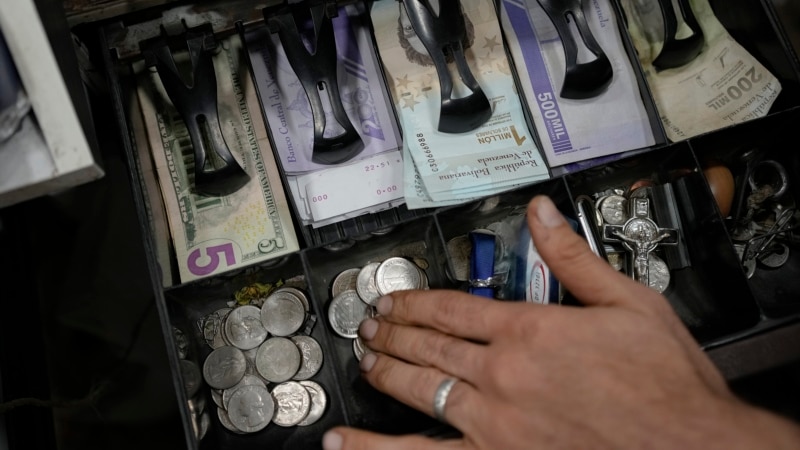
The Venezuelan economy is experiencing a “dramatic” drop after its recovery last year in several productive sectors and faces the possibility of falling into recession, experts warn.
Independent research estimates that Venezuela had an economic growth of between 10 and 14 percentage points in 2022, the highest in all of Latin America. Its Central Bank indicated that the rise had been close to 17 points.
The increase in the price of oil above 120 dollars due to Russia’s invasion of Ukraine, the “slight recovery” of local oil extraction and a process of “greater liberalization and permissiveness” to investment and the flow of capital in Venezuela favored this “quite positive” behavior in most of 2022, explains economist Manuel Sutherland.
This recovery occurred after a loss of 80 points in gross domestic product between 2013 and 2021, “the worst crisis in the history of capital without the presence of a warlike aggression” internal or external in the affected country, recalls Sutherland.
Already at the end of the third quarter of the year, exchange rate instability, the payment by the State of bonds owed to millions of workers, retirees and pensioners and the injection of “inorganic money” or without support by the Central Bank reversed that optimistic spirit of the economy to a “disastrous crash” in recent months, he says.
Sutherland points out that a key point in the recent economic collapse was “exchange instability” experienced since August of last year, when the official dollar rate went from 4.5 bolivars per unit to 8, 10, 12 and, finally, more than 20 bolivars.
“That exchange disaster destroyed the purchasing power of the working class and the amounts of real money circulating in the economy,” he indicated in conversation with the voice of america.
According to reports from business, industrial and various economic sector federations, sales fell in the first quarter of 2023 between 25% and 40%, compared to the last months of last year, he underlines.
“This is very serious, it is a very, very drastic, unusual drop. In the first quarter of this year, the economy fell 8%, which is terrible, it is a disastrous drop”, points out the director of the Center for Worker Research and Training (CIFO).
impending recession
The situation has not improved after the negative reports in the first quarter, although forecasts of economic growth in the South American country of 2 to 3 points in 2023 are maintained, he assures the VOA the economist and dean of the Faculty of Economic Sciences of the Metropolitan University of Caracas, Luis Oliveros.
The government does not have the tools that any other may have, such as the possibility of increasing public spending.
“What has happened in the first 5 months of the year, with the drop in sales and the slowdown in economic activity, could indicate that, if there is no significant improvement for the second semester, we are going to have a recession,” he asserts. .
Oliveros sees “only one possibility” that Venezuela does not enter a recession: that oil production continues to increase “in a significant way” this year.
Venezuelan crude production went from 756,000 to 810,000 barrels between last March and April, the state-owned PDVSA informed the Organization of Petroleum Exporting Countries (OPEC).
Petróleos de Venezuela plans to reach 1 million barrels per day by the end of the year, but the promise is made after a corruption scandal within the company, where more than 21,000 million dollars would have been embezzled from the State and for which the minister and Chavismo strongman, Tareck El Aissami, resigned.
Chevron, which has increased its production to 250,000 barrels since rreceived a license in november that eased the economic sanctions of the United States, can be key in the industry and, therefore, in the local economy, Oliveros believes.
“PDVSA doesn’t have a track record of keeping its promises, but there is Chevron. There are possibilities that other foreign companies join the oil production. If oil production responds, we could have economic growth this year,” he says.
Tips to avoid it
Sutherland, for his part, believes that “a great national agreement” is urgent to revive the economy and achieve social reconstruction, as well as joint work to preserve assets abroad, such as CITGO, and address the humanitarian crisis.
It advises to “drastically” reduce the banking legal reserve, which does not exceed 3% in countries like Peru, but which stands at 73% in Venezuela for the national currency.
Another recommendation of his would be to “monetize with simple financial instruments”, such as oil bonds, to pay off debts with suppliers and create an “emergency salary” fund. In addition, he believes that it would be healthy to reduce “non-productive bureaucratic spending”, such as the military.
Oliveros, for his part, considers it advisable to “promote dollarization” to stimulate the economy and avoid a recession. President Maduro recently set out to “de-dollarize” the Venezuelan economy, however.
“If the government intends to de-dollarize the economy, Venezuela will fall into recession, because it will have a very strong impact on the economy,” says the expert.
Connect with the Voice of America! Subscribe to our channel Youtubeand activate notifications, or follow us on social networks: Facebook, Twitter and Instagram.






![[Img #74675]](https://thelatestnews.world/wp-content/uploads/2024/12/They-discover-a-new-class-of-X-ray-sources-in-the-150x150.jpg)






